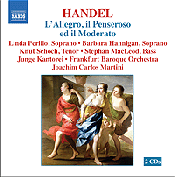Handel, with works like the allegorical Il Trionfo del Tempo or the distinctly non-narrative Messiah, embraced this flexible sense of the genre well. Here a concoction blending texts from Milton’s poems of outlook, “L’Allegro,” and “il Penseroso,” and Charles Jennens’ via media between them (“il Moderato”) becomes an oratorio extolling a moderate, temperate path between the affective extremes of cheerful mirth and brooding melancholy. No dramatic narrative, no plot, no explicit religious theme, no scriptural text. The premise of the libretto then may stretch our sense of the genre, but it requires little if any stretch to see how well it accords with larger Handelian themes. Decades ago, Donald Grout, in a memorable phrase, urged us to think of eighteenth-century opera seria as an “opera of moods,” a dramatic form in which the conflict of plot and characters is subsumed by the conflict of the emotions they represent. In L’Allegro, il Penseroso ed il Moderato we find a trope of that same idea in the oratorio: rival moods are in conflict and they seek a harmonic resolution.
There are a number of compelling aspects of this recording. Martini’s interpretation is stylistically convincing, born, one suspects, of his deep immersion in this repertory. The solo playing of the Frankfurt Baroque Orchestra is of a high order, and with the wonderful obligatto writing for solo flute, horn, viola da gamba, trumpet, oboe, and bassoon, Handel highlights them in many of the oratorio’s most memorable movements. The Canadian soprano, Linda Perillo, offers a gratifyingly clear and pure high register that she uses to advantage in her Penseroso sections. And this, with her ability to negotiate ornamental passagework with flair and precision, makes her the most stylistically adept of the soloists. Admittedly, some of her singing here suffers from pitch problems in the low register, but the overall impression is of one much at home in this style. Her Allegro soprano counterpart is Barbara Hannigan, a casting that proves advantageous, for the contrast of sound between the two sopranos heightens the sense of character. Perillo’s pensive pose is well served by her purity of sound; similarly Hannigan’s mirthful milieu is enhanced by the vibrancy of her voice. To some ears, this vibrancy will seem exaggerated in this style. Though not totally pervasive, her vibrato seems to go beyond ornamental discretion to the point that much sounds trilled—even on uneventful weak syllables. Nevertheless, her vibrancy does not hamper her agility and articulation, and she brings to her airs a compelling sense of character. The men have a bit less to do. Bass Stephan MacLeod possesses a congenial sound and a well deployed technical agility. However, both he and tenor Knut Schoch on occasion lapse into an English pronunciation that is more foreign than one might wish. And Schoch’s lack of attention to articulation in rapid passagework can also be problematic.
As with other of Martini’s Handel recordings, this is a recording of a live concert given at the Cistercian Kloster Eberbach. This generous acoustic seems to have created a number of problems, as well. The chorus sounds as though it is singing in a cavern, distant and with little presence. The soloists seem welcomingly much closer at hand, but whatever engineering has brought them there also seems to have veiled their sound. As a result of live recording in a challenging setting, balance issues emerge problematically, as well, particularly among the instrumental forces in the hauntingly beautiful air, “But oh, sad Virgin.”
I have reserved the final criticism for the recording company, Naxos, whose failure to supply a libretto within the CD package is a frustrating economy. Though sung in English, the text is both long and literary, and listening without a libretto tends to leave the listener lost in Handel’s sounds, pleasantly diverted, but lost nonetheless. Naxos does invite the listener to download a libretto from their website, however. This I did. Now I wonder what to do with the twelve full-size pages! If this is the way of the future, the loss of convenience is a nettlesome one.
In the final reckoning, this recording of L’Allegro, il Penseroso, ed il Moderatopresents a fair number of blemishes. However, it also provides a reading that rewards and gratifies in a number of instances. At the end of the oratorio the libretto extols moderation; at the end of this review, I find myself gravitating to a moderate position as well.
Steven Plank
Oberlin College
